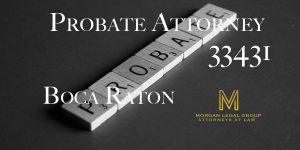Florida Probate Process in 2024: A Detailed Guide by Morgan Legal Group
At Morgan Legal Group, situated at the heart of Miami, we understand that navigating the probate process in Florida can seem daunting. With the legal landscape constantly evolving, our team is here to provide clarity and guidance every step of the way. This comprehensive guide aims to demystify the probate process in 2024, ensuring you are well-equipped to handle the challenges it may present.
What is Probate?
Probate is a legal process that occurs after someone passes away. It involves proving in court that a deceased person’s will is valid, identifying and inventorying the deceased’s property, appraising the property, paying debts and taxes, and distributing the remaining property as the will (or state law, if there’s no will) directs.
Step 1: Understanding Florida’s Probate Requirements
The probate process in Florida varies depending on the presence of a will and the estate’s size. It ranges from a simple disposition without administration for very small estates to formal administration for larger estates. Knowing which process applies to your situation is crucial for a smooth probate journey.
Step 2: Initiating the Probate Process
The first formal step is filing a petition for administration with the probate court. This action requests the court to officially recognize the death and appoint a personal representative (executor) for the estate.
Step 3: The Role of the Personal Representative
Once appointed, the personal representative plays a pivotal role. They’re responsible for gathering the deceased’s assets, notifying creditors, paying valid claims, filing tax returns, and ultimately distributing the assets to the rightful heirs.
Step 4: Managing Estate Assets
One of the most intricate parts of probate involves managing the deceased’s assets. This includes everything from safeguarding property to selling assets to pay off debts and taxes. The personal representative must also keep detailed records and report to the court and beneficiaries on the estate’s administration progress.
Step 5: Addressing Debts and Taxes
Florida law mandates the payment of the deceased’s debts and taxes before distributing assets to beneficiaries. This often involves negotiating with creditors and ensuring all tax obligations are met, tasks that can benefit from professional legal assistance.
Step 6: Distributing Assets to Beneficiaries
After all debts and taxes have been settled, the remaining assets are distributed to the beneficiaries. This final step can be straightforward if the will is clear and uncontested, but it may become complicated if disputes arise.
Common Challenges and How to Overcome Them
From will contests and disputes among beneficiaries to the complexities of asset valuation, the probate process can present numerous challenges. Experienced legal guidance can help navigate these issues, ensuring compliance with legal requirements and safeguarding the estate’s value.
Morgan Legal Group: Your Partner in Probate
At Morgan Legal Group, our expertise in probate law positions us uniquely to assist you through every phase of the probate process. With a deep understanding of the nuances of Florida law and a commitment to personalized service, we ensure your probate experience is as seamless and stress-free as possible.
Conclusion
The probate process in Florida in 2024 demands meticulous attention to detail and a thorough understanding of legal procedures. By partnering with Morgan Legal Group, you benefit from expert legal guidance tailored to your unique situation, ensuring the legacy of your loved ones is honored and preserved.
Contact us today to learn how we can assist you with the Florida probate process, providing peace of mind during a challenging time.








